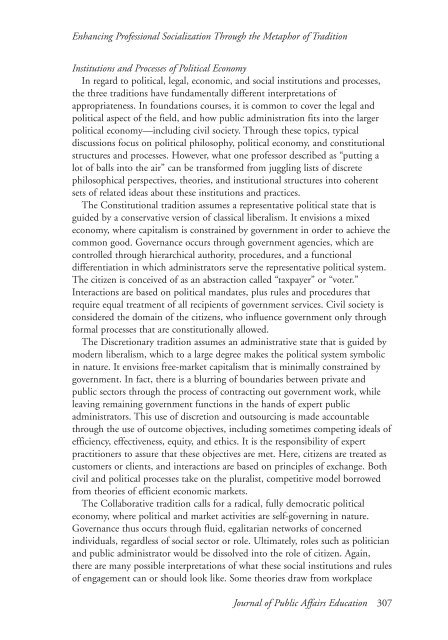JOURNAL OF PUBLIC AFFAIRS EDUCATION - naspaa
JOURNAL OF PUBLIC AFFAIRS EDUCATION - naspaa
JOURNAL OF PUBLIC AFFAIRS EDUCATION - naspaa
Create successful ePaper yourself
Turn your PDF publications into a flip-book with our unique Google optimized e-Paper software.
Enhancing Professional Socialization Through the Metaphor of Tradition<br />
Institutions and Processes of Political Economy<br />
In regard to political, legal, economic, and social institutions and processes,<br />
the three traditions have fundamentally different interpretations of<br />
appropriateness. In foundations courses, it is common to cover the legal and<br />
political aspect of the field, and how public administration fits into the larger<br />
political economy—including civil society. Through these topics, typical<br />
discussions focus on political philosophy, political economy, and constitutional<br />
structures and processes. However, what one professor described as “putting a<br />
lot of balls into the air” can be transformed from juggling lists of discrete<br />
philosophical perspectives, theories, and institutional structures into coherent<br />
sets of related ideas about these institutions and practices.<br />
The Constitutional tradition assumes a representative political state that is<br />
guided by a conservative version of classical liberalism. It envisions a mixed<br />
economy, where capitalism is constrained by government in order to achieve the<br />
common good. Governance occurs through government agencies, which are<br />
controlled through hierarchical authority, procedures, and a functional<br />
differentiation in which administrators serve the representative political system.<br />
The citizen is conceived of as an abstraction called “taxpayer” or “voter.”<br />
Interactions are based on political mandates, plus rules and procedures that<br />
require equal treatment of all recipients of government services. Civil society is<br />
considered the domain of the citizens, who influence government only through<br />
formal processes that are constitutionally allowed.<br />
The Discretionary tradition assumes an administrative state that is guided by<br />
modern liberalism, which to a large degree makes the political system symbolic<br />
in nature. It envisions free-market capitalism that is minimally constrained by<br />
government. In fact, there is a blurring of boundaries between private and<br />
public sectors through the process of contracting out government work, while<br />
leaving remaining government functions in the hands of expert public<br />
administrators. This use of discretion and outsourcing is made accountable<br />
through the use of outcome objectives, including sometimes competing ideals of<br />
efficiency, effectiveness, equity, and ethics. It is the responsibility of expert<br />
practitioners to assure that these objectives are met. Here, citizens are treated as<br />
customers or clients, and interactions are based on principles of exchange. Both<br />
civil and political processes take on the pluralist, competitive model borrowed<br />
from theories of efficient economic markets.<br />
The Collaborative tradition calls for a radical, fully democratic political<br />
economy, where political and market activities are self-governing in nature.<br />
Governance thus occurs through fluid, egalitarian networks of concerned<br />
individuals, regardless of social sector or role. Ultimately, roles such as politician<br />
and public administrator would be dissolved into the role of citizen. Again,<br />
there are many possible interpretations of what these social institutions and rules<br />
of engagement can or should look like. Some theories draw from workplace<br />
Journal of Public Affairs Education 307
















